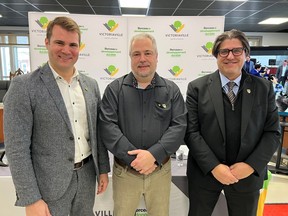It's the first municipality in Quebec — and possibly in Canada — to create the position to support councillors in exploring innovative practices.

Victoriaville is betting on its appointment of the first chief scientific advisor in Quebec to change the way municipal councils govern.
On Monday, the city of 48,000 residents, about 140 kilometres east of Montreal, became the first municipality in the province and possibly in Canada to create the position to support councillors in exploring innovative practices.
Sign up to receive daily headline news from the Montreal Gazette, a division of Postmedia Network Inc.
Thanks for signing up!
A welcome email is on its way. If you don't see it, please check your junk folder.
The next issue of Montreal Gazette Headline News will soon be in your inbox.
The council approved the appointment of Simon Barnabé, a professor at the Université du Québec à Trois-Rivières, as Victoriaville’s chief scientific advisor.
“Currently, scientific advice to governments focuses mainly on provincial governments or national governments,” Barnabé said.
“It hasn’t happened yet at the local government level and that’s what we’re putting forward with this new status. As far as small- and medium-sized cities are concerned, this is really a first.”
The position, which isn’t remunerated, represents “a new way for small and medium-sized towns to bring science closer to their municipal decision-makers and to help them play a central role in the ecosystem of research and innovation,” he said.
Barnabé is holder of the Municipal Research Chair for Sustainable Cities and co-holder of the Industrial Research Chair in Bioenergy and the Regional Bioeconomy.
“We have always had great ambitions in terms of development,” Victoriaville Mayor Antoine Tardif said. “Now we can have an even greater impact on our environment, for our citizens, our city and also be a positive leader for other municipalities in Quebec.”
Municipalities face more and more environmental challenges, Tardif said, including the fight against climate change, protection of biodiversity and the reduction of greenhouse gases.
Barnabé’s role is to make independent recommendations to city council on its actions on all environmental fronts, he said.
Victoriaville was already collaborating with Barnabé, the mayor added.
“Victoriaville has the ambition to develop a green and circular economy,” Tardif said. With the province appointing Rémi Quirion as chief scientist of Quebec, Victoriaville now has “a direct line with the highest scientist of the Quebec government,” he said. “It also gives us access to the network of contacts of Mr. Barnabé, his research colleagues and other institutions with which he collaborates, which will be beneficial to us since we do not have a university on our territory to have this expertise.”
Barnabé said he would like other municipalities to follow suit so that a province-wide network of scientific advisors can be developed to share expertise and discuss issues that might be common to several communities.
The Union des Municipalités du Québec welcomed the initiative.
“Victoriaville has always been at the forefront of the environment and it demonstrates it again with this appointment,” Varennes Mayor Martin Damphousse, who chairs the UMQ’s climate change committee said.
Recent studies carried out by the firms Ouranos and WSP on behalf of the UMQ have “demonstrated beyond a shadow of a doubt that the impact of adaptation to climate change will represent the largest new expenditure to come for cities, with an average of 12 per cent of our budgets. It’s huge,” Damphousse said.
However, existing municipal infrastructure, built and renovated in the traditional way, are not designed for extreme weather conditions, he said. This is why a chief scientific adviser could make it possible to innovate by bringing elected municipal officials to “think outside the box,” Damphousse said.
This article was produced with financial assistance from the Meta-Canadian Press news fellowship.


